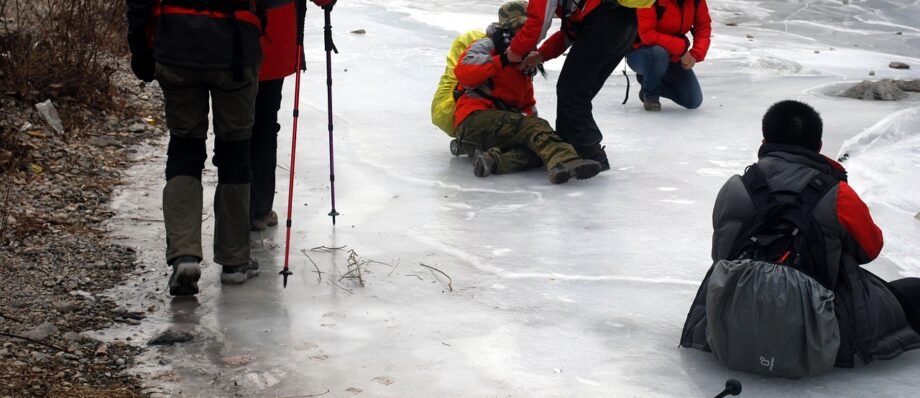Understanding Slip and Fall Accidents
Slip and fall accidents are more common than many people realize. Whether it happens in a grocery store, on a sidewalk, or at work, these accidents can lead to serious injuries and unexpected medical expenses. If you’ve been injured due to someone else’s negligence, you may be entitled to compensation. But what exactly can you receive, and how do you go about claiming it?
Types of Compensation Available
If you’ve suffered a slip and fall accident, you may be eligible for different types of compensation, depending on the severity of your injuries and the circumstances of your case.
1. Medical Expenses
The most immediate and significant cost of a slip and fall accident is medical treatment. Compensation can cover:
- Emergency room visits
- Hospital stays
- Surgeries and procedures
- Medications
- Physical therapy
- Ongoing medical care
- Assistive devices (e.g., crutches, braces)
Learn more about medical costs related to injuries from the CDC
2. Lost Wages and Loss of Earning Capacity
If your injuries prevent you from working, you may receive compensation for lost income. This includes:
- Wages lost during recovery
- Reduced earning capacity if your injuries impact your ability to work in the future
- Loss of benefits (e.g., retirement contributions, bonuses)
See the U.S. Bureau of Labor Statistics for wage-related data
3. Pain and Suffering
Beyond medical bills and lost wages, slip and fall victims may receive compensation for physical pain and emotional distress. Courts consider factors such as:
- Severity of injuries
- Duration of pain
- Emotional trauma (anxiety, depression, PTSD)
Understand emotional distress claims at the Legal Information Institute
4. Disability and Disfigurement
If the accident results in permanent disability or scarring, additional compensation may be awarded to account for the long-term impact on your life and well-being.
5. Loss of Quality of Life
Serious injuries can affect daily activities and personal enjoyment. If you can no longer engage in hobbies or maintain relationships as you did before, you may be entitled to additional compensation.
6. Punitive Damages
In rare cases where the property owner’s negligence was especially reckless, courts may award punitive damages to punish the responsible party and prevent similar incidents.
For legal precedents on punitive damages, visit the American Bar Association
How Is Compensation Determined?
Several factors influence how much compensation you may receive:
- Severity of Injuries: More severe injuries typically result in higher compensation.
- Medical Costs: Higher medical expenses can increase settlement amounts.
- Liability: The clearer the fault, the stronger your case.
- Impact on Work and Life: If your injuries drastically alter your lifestyle, compensation may be higher.
For case evaluation tools, check out NOLO’s personal injury guide
Proving Liability in a Slip and Fall Case
To receive compensation, you must prove that another party was responsible for your accident. This typically involves demonstrating:
- A Hazardous Condition Existed – Wet floors, uneven pavement, or poor lighting contributed to the fall.
- The Property Owner Knew or Should Have Known About It – They failed to fix or warn about the danger.
- The Hazard Directly Caused Your Injury – Medical records and witness statements support your claim.
What to Do After a Slip and Fall Accident
Taking the right steps after a fall can strengthen your case:
- Seek Medical Attention – Get treated immediately and document your injuries.
- Report the Incident – Notify the property owner or manager and get a written report.
- Gather Evidence – Take photos, collect witness contact information, and save medical bills.
- Consult a Personal Injury Lawyer – An attorney can guide you through the legal process and maximize your compensation.
Frequently Asked Questions (FAQs)
1. How long do I have to file a slip and fall lawsuit?
The statute of limitations varies by state but typically ranges from 1 to 3 years from the date of the accident.
2. Can I still get compensation if I was partially at fault?
Yes, but it depends on your state’s negligence laws. Some states allow partial compensation under comparative negligence rules.
3. How much is a slip and fall case worth?
It depends on the severity of injuries, medical costs, and lost income. Settlements range from a few thousand to hundreds of thousands of dollars.
4. Do I need a lawyer for my slip and fall case?
While not required, hiring a personal injury lawyer significantly increases your chances of receiving fair compensation.
5. Will my case go to court?
Most slip and fall cases settle out of court, but if an agreement isn’t reached, a lawsuit may be necessary.
Final Thoughts
Slip and fall accidents can have serious consequences, but knowing your rights and taking the right legal steps can help you secure the compensation you deserve. If you’ve been injured, don’t hesitate to seek medical care, document everything, and consult an experienced personal injury attorney.
Get the Compensation You Deserve After Your Accident
If you’ve been injured in a car crash that wasn’t your fault, don’t settle for silence or confusion. Lawayer.com connects you with› experienced attorneys who can fight for your rights and help you recover what you’re owed. Time matters—take the first step now


